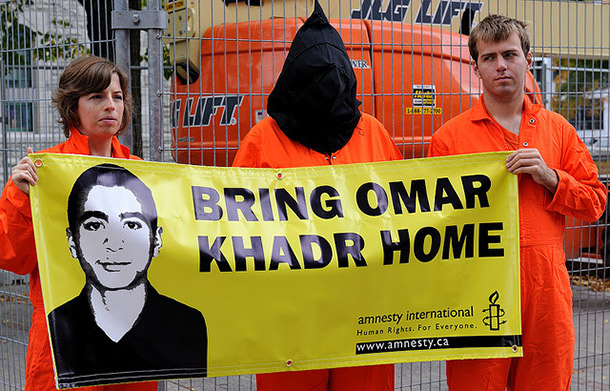With the release on bail of Omar Khadr, Canada got its first chance to see and hear a fellow citizen who has been imprisoned for half his life by our closest ally and our present prime minister.
Khadr has been treated with the blithely racist injustice we handed out to B.C.'s Japanese-Canadians in 1942, not really for anything he did, but for the people we have associated him with.
In the process, we have discredited ourselves far more than we have discredited a very unfortunate young man. We have called into question our own dedication to the legal and democratic values we say we cherish.
The case of Omar Khadr is a disquieting echo of a very different case over a century ago: that of a French artillery officer, Capt. Alfred Dreyfus, whose rigged court-martial and imprisonment foreshadowed the horrors of two world wars and the decline of a world power.
The details of the Dreyfus case are very well known; Adam Gopnik's summary of it in the The New Yorker is a good introduction. To summarize it still further, in the 1890s a shady French officer named Ferdinand Walsin Esterhazy volunteered to sell military secrets to the Germans, and French counter-espionage got wind of it.
Rather than catch the real culprit, though, French intelligence agents found Dreyfus as a useful suspect: he'd been born in Alsace in 1859 when it was still a French province, before it was conquered by Germany in the Franco-Prussian War of 1871. He still visited relatives in Alsace. And conveniently, he was a bourgeois Jew, one of the new men gradually replacing the French officer-aristocrats who'd lost that war.
Tried in a court-martial, found guilty and publicly degraded, Dreyfus was packed off to Devil's Island in South America still protesting his innocence. But as the years passed, the evidence against him looked worse and worse. Eventually the famous French novelist Émile Zola published his famous "J'Accuse" polemic, accusing everyone from the French president on down of having imprisoned an innocent man.
A nation split down the middle
The case split France right down the middle, between democratic secular Dreyfus supporters and aristocratic Catholic reactionaries. Anti-Semitism had been an open sore in Europe ever since the fall of Rome, but now it turned into something much more malevolent -- and within half a century, it turned into the Holocaust.
Dreyfus was eventually pardoned (not acquitted), brought home from Devil's Island, and even awarded the Legion of Honour. He served as a competent officer in the First World War and died in 1935. By then, French society had become polarized between the "Old Regime" based on the church and the army and fuelled by anti-Semitism, and the republicans who wanted a secular left-wing society. That divide persisted at least to the end of the Second World War.
Omar Khadr seems not to resemble Alfred Dreyfus, but the parallels are there. Since 9/11, anti-Islamic views have been an acceptable substitute for anti-Semitism, casting suspicion on a whole religion. In both cases, democratic institutions were stressed into perverting themselves: Dreyfus's court-martial was a kangaroo court, and so was Khadr's trial in Guantanamo. (The Guantanamo detention camp was set up precisely because prisoners sent there would lack the constitutional protections of being on American soil and the treaty protections of being prisoners of war.)
The U.S. government under George W. Bush was notably vindictive toward Omar Khadr, who by rights shouldn't have been imprisoned at all. He was, at 15, a child soldier; recruiting him was itself a war crime. Thousands of other child soldiers fill the ranks of Boko Haram and the Lord's Resistance Army, but governments and NGOs make efforts to rescue and rehabilitate them.
All-purpose enemy
Not in Omar Khadr's case. "Terrorists" have become the new all-purpose enemies, justifying any and all breaches of constitutional and treaty rights -- and his rights were well and truly breached by torture, a sham military trial, and a coerced confession.
Eventually the Americans calmed down and found Guantanamo an embarrassment; they began to ship the prisoners (many of them innocent) back home. But the Harper government refused to accept Omar Khadr until it absolutely had to. Then it dumped him in a maximum-security prison and fought in court against any effort to restore his rights as a Canadian citizen.
The Conservatives' eerie vindictiveness echoes that of the anti-Semitic French elite, who found Capt. Dreyfus a convenient scapegoat. Dreyfus was the enemy within, an ingrate who had betrayed his country and whose trial whipped up anti-German and anti-Semitic feelings. Omar Khadr serves the same purpose for the Conservatives, maintaining a useful level of paranoia in their base about our Muslim fellow-citizens.
France's institutions, stressed though they were, eventually survived and exonerated Capt. Dreyfus. Canadian institutions have at least managed to get Omar Khadr out of jail while he appeals his conviction. In that sense, we've survived a major stress test.
But millions in France went to their graves believing Dreyfus was guilty. Millions more support modern foreigner-hostile groups like the Front National.
Our own right-wingers, least of all Stephen Harper, will never admit they might have been wrong about the crime and punishment of Omar Khadr. The gap between Canada's right and left seems likely to persist as it has in France, with Omar Khadr as a bogeyman for one side and a victim for the other. ![]()
Read more: Rights + Justice
















Tyee Commenting Guidelines
Comments that violate guidelines risk being deleted, and violations may result in a temporary or permanent user ban. Maintain the spirit of good conversation to stay in the discussion.
*Please note The Tyee is not a forum for spreading misinformation about COVID-19, denying its existence or minimizing its risk to public health.
Do:
Do not: